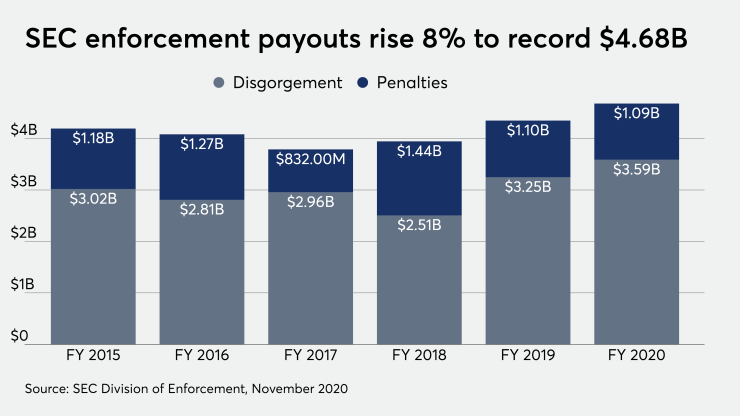The question of whether advisors have a duty to recommend cheaper fund share classes to clients is at the center of an increasing number of SEC enforcement cases, in a pattern that could signal major implications for wealth management firms.
Buried deep in the SEC’s spate of mutual fund share-class enforcement cases in recent years are allegations that firms violated best execution rules by failing to put their clients into the cheapest share classes available. The issue is whether an advisor’s duty to seek best execution -- which typically involves how broker-dealers are selected to execute a client’s transaction -- also includes a requirement to avoid expensive share classes. Client advocates say advisors have this duty; industry spokespeople say they don’t. SEC settlements like last week’s
Attorneys for wealth managers argue the SEC is misapplying the standard when charging firms with violations of best execution for selling clients higher-priced share classes when less expensive ones were available. The allegations appear to go beyond merely disclosing conflicts of interest like 12b-1 fees to a requirement that firms seek out the cheapest share classes.
“It's a symbolically important add-on that is a creditable effort on the part of the commission to start to give some meaning to this best interest, best execution obligation,” says Barbara Roper, the nonprofit Consumer Federation of America’s director of investor protection. “At the most basic level, that's not in the best interest of your customers, unless you’re doing something like offsetting.”
The industry attorneys counter that determining a clients’ best interest is more than finding the lowest costs. Amy Greer, co-chair of Baker McKenzie’s financial regulation and enforcement practice for North America, and other attorneys published
“The SEC has tried to consistently take the position that failure to select the lowest cost share class is a best execution violation, and most settled enforcement actions have included that allegation,” Greer wrote in an email. “That is unlikely to change.”
Representatives for the SEC didn’t respond to requests for comment.
In fact, firms should expect “the same regulatory requirements relating to share-class selection on advisory platforms to be imported over to brokerage platforms” based on Regulation Best Interest, according to WilmerHale attorney Amy Doberman. She represented Voya in its $23-million settlement and has worked on behalf of other wealth managers in similar cases.
In Doberman’s view, share-class selection “certainly” falls under advisors’ fiduciary duty, but it’s a “consummate example of regulation by enforcement” to use the best execution standard, she said in an emailed statement.
“Best execution is a concept that more properly applies when a security is purchased in the secondary market and where the price of execution is variable,” Doberman says. “Applying best execution to the purchase of mutual fund shares is an aggressive application of this concept and I think was inappropriately developed through enforcement settlements without providing any advance notice or guidance to the industry.”

Another area of concern for the industry revolves around differences of interpretation in cases where the SEC has alleged violations, according to the article by Greer and the other attorneys. In certain cases, the regulator found that the failure to invest clients in the cheapest share class was itself the violation. In others, it alleged firms violated best execution by not disclosing it.
“The result is confusion as to whether an adviser would be violating its fiduciary duty of best execution whenever it invests clients in a higher-fee share class when a lower-cost share class is available, or whether that best execution violation is tied to the adviser’s disclosure around its share class selection practices,” the attorneys wrote.
One firm is already protecting itself against potential enforcement. Corporate RIA clients of LPL Financial, the largest independent broker-dealer,
Fiduciary obligations shouldn’t be “waivable,” according to the Consumer Federation’s Roper. She says she doesn’t view 12b-1 fees as “inherently bad” and sees share classes with the distribution fees as reasonable options in some cases. She argues that clients should stop having to pay 12b-1 fees after the amount exceeds what they would have paid in upfront loads.
Roper anticipates that incoming President-elect Biden’s appointees will use their regulatory authority under existing rules to ban practices that aren’t in clients’ best interest.
“To the degree that firms are looking at ways to game the system right now, I would expect a stronger crackdown from the SEC with the new administration,” Roper says. “Instead of coming up with some temporary workaround, firms should just get rid of the conflict.”







